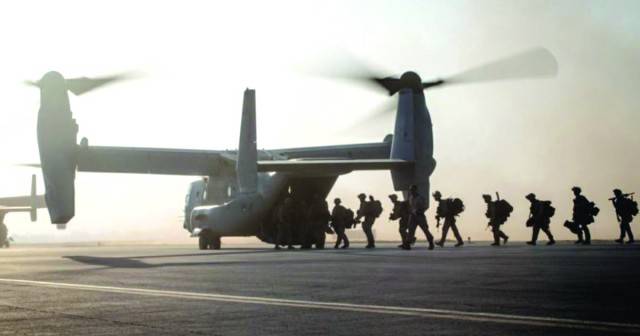
Earlier this week, it was reported that thousands of people were fleeing from their homes in the southern Helman province of Afghanistan due to fighting between the Taliban and government. Violence spiked as the US military handed over a base to the government and began to pull out its troops from Afghanistan. Afghan forces claimed to have repulsed the Taliban attack, while the Taliban claimed to have killed a large number of Afghan troops.
It is not just the Afghan civil population that is anxious about its future as the endgame in Afghanistan unfolds; the people of Pakistan - particularly from the newly merged districts of Khyber Pakhtunkhwa – are also deeply concerned.
Fears of a civil war in Afghanistan appear to loom large. Any upheaval in Afghanistan will inevitably spill over into Pakistan. Millions of Afghans living near the 2,600-kilometer-long Pakistan-Afghan border will be forced to seek refuge mostly in Khyber Pakhtunkhwa and to some extent in Balochistan having no other place to go. Given the historical cultural ties with the people on this side they simply cannot be turned back, fencing of the border notwithstanding. Given Pakistan’s own economic woes, social and ethnic divisions and now the pandemic the cost will be huge.
Apart from its huge economic, social and political cost, there is the fallout of the expansion in the space of the ‘saviors’. As a result, the hybrid system of governance will gain greater currency and the civil-military imbalance will be further imbalanced with consequences for the country’s social and political stability. It is for these reasons that the discourse in Pakistan on the end game in Afghanistan should be led by civil-political forces and not by the military as at present.
People and their representatives cannot afford to keep their eyes shut, look the other way and leave everything to the security establishment. The interests of people of Pakistan would be best served by political stability in Afghanistan and not when its government is resting on military support provided to it by a neighboring country. War is too serious a business to be left to the generals alone as the saying goes.
This is not to say that the Taliban are about to overrun their country. Far from it. The analysis by some that the Afghan military will collapse as soon as the US troops pull out is open to question. These analysts do not take into account a number of realities that have emerged during the last two decades post 9/11 and the fall of the Taliban regime in 2001.

The Afghan society has made remarkable gains during the last 20 years which it will not give up easily. Elections, however imperfect, have been held regularly. People have tasted the fruits of democracy and consultative governance. Afghan women have made great gains at equally great sacrifices, and these gains cannot be easily reversed. The physical infrastructure that lay in the ruins has largely been rebuilt. The elected civilian government that alternated during this period cannot be regarded as repressive like that of the Taliban. Expectations to live under relatively moderate administrations have increased and Afghans are unlikely to welcome a return to Taliban rule.
Taliban fighters number about 50,000 or so as against the Afghan national forces of around 300,000, almost six times the Taliban fighters. Afghan national forces have also received some modest training during the last two decades although much more needs to be done.
Taliban fighters may have controlled large chunks of rural areas but they have not been able to dislodge the government in Kabul. Even when they were in power the Taliban did not control the entire country; a significant part was controlled by the rival Northern Alliance. The claim by the Taliban that they were fighting against foreign occupation forces may have had takers in the past. But the reports recently of a secret clause in the February 2020 agreement requiring Taliban to defend US military interests from attacks by any militant group and the readiness of foreign forces to leave has dented past claims.
The realization that they have not been able to overwhelm the Kabul government should induce some sanity in the Taliban to work towards a negotiated political settlement. But it seems it has not. Why? Is it because the Taliban have sustained capacity to inflict damage on the Kabul government with the overt or covert support from outside? It is hard to avoid the suspicion that Taliban might be banking on some outside support to return to power through use of force instead of democratic and political processes.
The parliament and the civil society should therefore take the center stage with the aim to demilitarize the conflict in Afghanistan and help resolve it through political means.
The parliament should demand the demilitarization of former tribal regions and open it to the general public. It should also discuss implications of the US Central Command chief General McKenzie’s statement last month that the US was working with nations surrounding Afghanistan on agreements to base troops and aircraft.
Barricading the former tribal areas and enveloping them in secrecy even after merger with the province also breeds suspicions and mistrust. On Wednesday, the Islamabad High Court warned of initiating contempt proceedings against the secretary Ministry of Defence for delaying submission of a summary to the cabinet for providing internet access to tribal districts despite go ahead given to it by other stakeholders. It is time to demilitarize these tribal areas, open them up and bring back civilian rule to escape disastrous consequences of the US pullout from Afghanistan in an atmosphere of suspicion.
The writer is a former senator
It is not just the Afghan civil population that is anxious about its future as the endgame in Afghanistan unfolds; the people of Pakistan - particularly from the newly merged districts of Khyber Pakhtunkhwa – are also deeply concerned.
Fears of a civil war in Afghanistan appear to loom large. Any upheaval in Afghanistan will inevitably spill over into Pakistan. Millions of Afghans living near the 2,600-kilometer-long Pakistan-Afghan border will be forced to seek refuge mostly in Khyber Pakhtunkhwa and to some extent in Balochistan having no other place to go. Given the historical cultural ties with the people on this side they simply cannot be turned back, fencing of the border notwithstanding. Given Pakistan’s own economic woes, social and ethnic divisions and now the pandemic the cost will be huge.
Apart from its huge economic, social and political cost, there is the fallout of the expansion in the space of the ‘saviors’. As a result, the hybrid system of governance will gain greater currency and the civil-military imbalance will be further imbalanced with consequences for the country’s social and political stability. It is for these reasons that the discourse in Pakistan on the end game in Afghanistan should be led by civil-political forces and not by the military as at present.
The Afghan society has made remarkable gains during the last 20 years which it will not give up easily
People and their representatives cannot afford to keep their eyes shut, look the other way and leave everything to the security establishment. The interests of people of Pakistan would be best served by political stability in Afghanistan and not when its government is resting on military support provided to it by a neighboring country. War is too serious a business to be left to the generals alone as the saying goes.
This is not to say that the Taliban are about to overrun their country. Far from it. The analysis by some that the Afghan military will collapse as soon as the US troops pull out is open to question. These analysts do not take into account a number of realities that have emerged during the last two decades post 9/11 and the fall of the Taliban regime in 2001.

The Afghan society has made remarkable gains during the last 20 years which it will not give up easily. Elections, however imperfect, have been held regularly. People have tasted the fruits of democracy and consultative governance. Afghan women have made great gains at equally great sacrifices, and these gains cannot be easily reversed. The physical infrastructure that lay in the ruins has largely been rebuilt. The elected civilian government that alternated during this period cannot be regarded as repressive like that of the Taliban. Expectations to live under relatively moderate administrations have increased and Afghans are unlikely to welcome a return to Taliban rule.
Taliban fighters number about 50,000 or so as against the Afghan national forces of around 300,000, almost six times the Taliban fighters. Afghan national forces have also received some modest training during the last two decades although much more needs to be done.
Taliban fighters may have controlled large chunks of rural areas but they have not been able to dislodge the government in Kabul. Even when they were in power the Taliban did not control the entire country; a significant part was controlled by the rival Northern Alliance. The claim by the Taliban that they were fighting against foreign occupation forces may have had takers in the past. But the reports recently of a secret clause in the February 2020 agreement requiring Taliban to defend US military interests from attacks by any militant group and the readiness of foreign forces to leave has dented past claims.
The realization that they have not been able to overwhelm the Kabul government should induce some sanity in the Taliban to work towards a negotiated political settlement. But it seems it has not. Why? Is it because the Taliban have sustained capacity to inflict damage on the Kabul government with the overt or covert support from outside? It is hard to avoid the suspicion that Taliban might be banking on some outside support to return to power through use of force instead of democratic and political processes.
The parliament and the civil society should therefore take the center stage with the aim to demilitarize the conflict in Afghanistan and help resolve it through political means.
The parliament should demand the demilitarization of former tribal regions and open it to the general public. It should also discuss implications of the US Central Command chief General McKenzie’s statement last month that the US was working with nations surrounding Afghanistan on agreements to base troops and aircraft.
Barricading the former tribal areas and enveloping them in secrecy even after merger with the province also breeds suspicions and mistrust. On Wednesday, the Islamabad High Court warned of initiating contempt proceedings against the secretary Ministry of Defence for delaying submission of a summary to the cabinet for providing internet access to tribal districts despite go ahead given to it by other stakeholders. It is time to demilitarize these tribal areas, open them up and bring back civilian rule to escape disastrous consequences of the US pullout from Afghanistan in an atmosphere of suspicion.
The writer is a former senator

